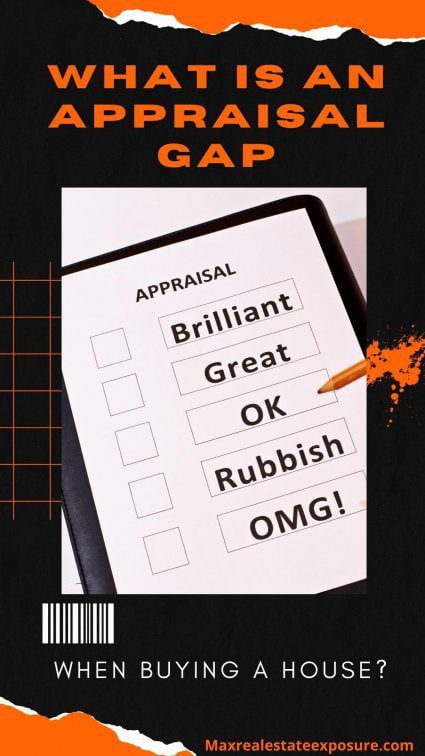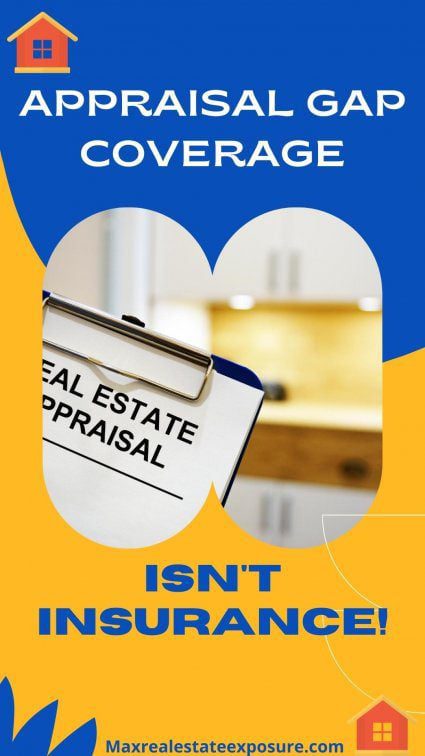 Many things happen when you buy a new home, and sometimes things don’t go your way. When purchasing with a mortgage, one issue you can have is an appraisal gap.
Many things happen when you buy a new home, and sometimes things don’t go your way. When purchasing with a mortgage, one issue you can have is an appraisal gap.
If there is an appraisal gap, you could lose your dream home.
We will examine what happens when the real estate appraisal is lower than the purchase price and what you can do about it.
From three decades of experience selling homes, I have dealt with appraisal deficiencies several times.
What is an Appraisal Gap?
The simple explanation of an appraisal gap is the amount you have agreed to pay for the home vs. what the real estate appraiser says it’s worth. That’s the meaning of a gap in a house appraisal.
In a seller’s real estate market where bidding wars on houses are the norm and not the exception, a seller does not want to accept an offer only to find out the property doesn’t appraise.
Because there is an increased chance of a house not appraising, home sellers often seek a cash offer to avoid this issue.
A buyer can take this worry away from a seller by offering to cover the difference in an appraisal shortfall.
That, my friends, is the definition of “appraisal gap coverage.”
The buyer is putting in writing as part of their offer that they will cover the difference should there be one in the home appraisal.
In real estate circles, it’s called an appraisal gap guarantee clause.
Home buyers cover the difference by increasing their down payment to satisfy the mortgage lender. This increases their chances of being the winning bidder in an offer situation.
Like escalation clauses, the value gap guarantee can give you a leg up on other home buyers. With an escalation clause, your offer price can vary depending on what other buyers do.
Understanding Low Appraisals in Different Market Conditions
Appraisal gaps can manifest differently depending on whether the real estate market favors buyers or sellers. Low appraisals are more common in a seller’s market where demand outstrips supply because buyers are often willing to pay above the market rate to secure a property.
Conversely, in a buyer’s market, where supply exceeds demand, properties may sell for less than their listed price, potentially reducing appraisal differences.
Understanding these market dynamics can help buyers and sellers strategize appropriately. For instance, sellers in a hot market might expect and hold out for offers that exceed the appraised values, while buyers might need to prepare financially to cover potential gaps to make their offers more attractive.
What is an Appraisal Gap Clause?
Over my thirty-eight years practicing real estate, I’ve had numerous discussions with clients about adding a gap coverage clause to an offer.
An appraisal gap clause adds wording to a real estate contract that says a buyer will agree to pay the difference between the appraised value and purchase price up to a specified amount.
The clause spells out precisely how much you are willing to cover. Many buyers will agree to a guarantee covering the shortfall in hot seller’s markets.
It would become an appraisal gap guarantee. Another name for this is an appraisal gap waiver.
Example of How it Works
Here’s a brief example to demonstrate how the appraisal gap functions. Suppose you’re a buyer considering a home with a listed price of $600,000. You submit an offer for the complete amount, which the seller agrees to.
However, when the appraiser appointed by your lender evaluates the property, they conclude that its actual value is only $570,000. This results in an appraisal gap of $30,000, indicating that you’re requesting your mortgage provider to lend you $30,000 more than the property’s appraised value.
Depending on your down payment amount, this gap must be addressed before the sale can proceed.
What Are Appraisal Gap Addendums?
A separate addendum may be used when adding appraisal gap language to a real estate contract. The supplement will specifically add precisely what the buyer agrees to do.
A supplemental addendum for a low value can ensure it won’t be missed when offers are reviewed.
Example of Coverage Language For Value Discrepancies
Here is the appraisal gap clause language I have used in my agreements.
The following is the language that can be included in a real estate contract that discusses an appraisal gap guarantee.
BUYER has waived their appraisal contingency and acknowledges that if their lender’s appraisal does not equal at least the purchase price herein, the BUYER will pay the difference in funds between what the lender is willing to lend and the purchase price herein to obtain their financing approval.
Any condition in BUYER’s commitment or denial letter related to the appraised value or lack of BUYER funds available to make up the difference shall not be construed as a valid reason for BUYER to void this agreement and for deposits to be refunded.
Please note this appraisal gap example does not include a cap. It can be added if a buyer would like to place a limit on their value gap coverage.
Appraisal Contingency vs. Appraisal Gap Coverage
It should be clarified that a contingency and a gap are entirely different. An appraisal contingency clause gives a buyer the right to cancel the contract if the contract price does not match the appraised value.
So, an appraisal gap contingency is the exact opposite of an appraisal gap guarantee.
You could lose your earnest money deposit in an escrow account without an appraisal contingency. Earnest money is typically one to five percent of the purchase price, but it is by no means chump change.
As a real estate agent, depending on which side of the fence you sit on could dictate the structure of the sales contract. Working in a competitive market could also dictate how the real estate contract is written.
It’s another one of those real estate terms to know when buying or selling a house.
What Are Home Appraisals?
A licensed home appraiser will determine the home’s appraised value. A property appraisal is considered an evaluation by an unbiased third party.
The valuation process typically takes place a few weeks after the buyer has applied for their mortgage.
The buyer’s lender needs to ensure they aren’t loaning more money than the home is worth. The appraiser’s report protects the lender should the homeowner default and end up in foreclosure, which could cost them money.
When buying a home, the property appraisal is also crucial to you. You won’t want to purchase a house worth more than your offer most of the time. If you did this, you would have negative equity on the home you bought.
It is usually a requirement from lenders to have a property appraisal that is higher than or the same as the offer amount. If this isn’t the case, there will be insufficient collateral for the lender should you default on the loan.
However, this situation is more common in today’s market, where more buyers than homes are available. Bidding wars happen more frequently, and because the appraiser is using sales data from up to 6 months before, there is a chance the evaluation will be lower than the offer.
What Does a Home Appraiser Do?
 The licensed appraiser will examine several things to assess the home’s fair market value. The appraiser’s job is to evaluate the property’s condition and comparable home sales.
The licensed appraiser will examine several things to assess the home’s fair market value. The appraiser’s job is to evaluate the property’s condition and comparable home sales.
Let’s take a look at these things in closer detail:
The Condition of The Home
The appraiser will look at the overall condition of the home. They should ensure the house is safe, the systems function correctly, and the property is sound.
The square footage, the number of bedrooms, bathrooms, and other features will also form part of their assessment.
The Location of The Property
Location plays a significant role in home prices. For example, the sale price of homes in neighborhoods is usually much higher than the same property on a busy street.
Popular areas of a city or town can also significantly influence property values. Similarly, a school district could substantially affect a home’s worth.
Comps or Comparable Sales
Comparable properties make up an essential part of the appraiser’s report. They try to find homes with similar features that have been sold within the last six months. Recent sales will be far more relevant, especially if the current market has home values changing rapidly.
Appraisers will look for homes that have the same number of bedrooms and bathrooms and are close to the location of the house they are assessing.
In theory, doing so should give a good indication of the property’s fair market value.
If the days on the market of the subject property are high relative to other properties, the appraiser will likely do further digging to find out why.
The mortgage company will not approve financing for more than the property’s fair market value. If the appraiser decides the home you buy is worth less than the offer amount, a gap will exist.
Dealing A Low Appraised Value
The lender will only provide a mortgage up to the home’s value as the appraiser decides.
When the offer and appraisal differ, it doesn’t necessarily mean the purchase has to end. You can negotiate with the seller or pay the difference yourself.
If your purchase offer includes a gap clause as a contingency, you’ll be required to make up the difference.
As mentioned, having this clause in competitive housing markets is not unusual.
You Can Limit Your Coverage
Being the winning bidder in a seller’s market is much more complicated. There is usually substantial competition for most homes. You want to make a competitive offer but not significantly overpay for a property.
If this sounds like your situation, you could put in an offer that has a limited gap coverage. For example, the asking price for a home is $500,000. You could bid for $550,000 but only agree to cover an appraisal gap of $25,000.
So, there would be no value gap if the valuation comes in at $525,000 or more. If the appraiser came in with a lower value than $525,000, you could potentially walk away from the sale.
Keep in mind that by limiting the appraisal gap coverage, your offer will not be looked at as favorably by the seller or listing agent. Covering a value gap entirely with low inventory and high demand might be necessary.
Discuss the market conditions with your real estate agent for the best offer.
What Can You Do When The Appraisal Is Lower Than The Offer?
 While a low appraised value will be disappointing, there are options to resolve a difference.
While a low appraised value will be disappointing, there are options to resolve a difference.
Negotiating a Lower Price
The option is to return to the seller and ask if they will accept the appraised value instead of the offer. Doing so will be difficult in hot markets, but you can ask them to help you close the gap.
If they don’t go to drop the price to the appraised value, perhaps they will meet you halfway or partway.
If there is a $20,000 difference between the offer and the appraisal, they may drop the price by $10,000. But if they are only willing to lower the price by $5,000, this will also help you.
Risk is involved if the seller has other buyers lined up to purchase their property. Backup offers could be waiting to pounce.
Covering The Gap in Value
You’ll need to do that if you have offered a value gap guarantee in your real estate contract. If you don’t proceed, you risk losing your deposit if you can’t make up the difference.
An unfavorable appraisal difference is frequently problematic for buyers, meaning you need to find the difference in addition to a down payment.
If you don’t have additional funds to do this, you can ask your family for help. Gift letters can be used to cover a gap and make a down payment.
There are other options, including using any retirement funds you have. You might find you can raid these funds without penalty, though you’ll need to check with your tax advisor to be sure of your options.
Disputing The Appraised Value
As a buyer, you might not agree with the appraised value, but you do have the option of disputing the finding. However, you should only do this if it’s clear the appraiser has made mistakes or didn’t do a thorough enough job.
You will need evidence to prove your case, and your dispute needs to be put in writing. Winning a low appraisal dispute is complicated. Few home sellers will come out on top in this fight.
Getting a Second Opinion
Getting another appraisal will mean applying for a new home loan with another lender. The same mortgage lender will not get another assessment.
The appraised value of a home is locked in with a lender unless a challenge is won.
Backing Out of The Sale
If the other options aren’t available, you can always walk away from the home purchase. While this isn’t easy, it may be the best choice. Do your best to renegotiate before making this decision. It is important to exhaust all options before walking away.
Appraisal Short Fall Coverage Isn’t Insurance For a Buyer
 Gap coverage might sound like insurance, but it isn’t. Instead, it is part of the purchase contract that commits the buyer to continue to purchase when the value of the item changes.
Gap coverage might sound like insurance, but it isn’t. Instead, it is part of the purchase contract that commits the buyer to continue to purchase when the value of the item changes.
Please read your purchase contract carefully before you sign it. If this clause is included, you can either have it removed or limit the gap you must pay.
Is Gap Coverage Sometimes Necessary?
While you don’t want to spend more money buying the home than is necessary, sometimes agreeing to a coverage clause is a good idea.
By now, you probably understand if the seller has multiple bids, gap coverage can make your proposal more competitive.
If multiple buyers are lining up to buy the home, there is a greater chance that the appraisal won’t match the offers. In such a situation, sellers are likelier to favor proposals with a gap coverage clause.
If you want your offer to stand out in a hot market, this type of clause could help.
For the seller, the risk of the purchase falling through increases when there is a financing contingency. It also ensures there won’t be problems when there is a reasonable value disparity, something that might otherwise delay the sale or allow the buyer to walk away.
Including appraisal gap coverage in the contract allows the buyer and seller to deal with the situation should it happen. It is a way of putting an agreement in writing so that everyone is clear about where they stand.
The more these things can be dealt with in advance in the contract, the less stressful it should be for everyone.
Does an Appraisal Shortfall Go Towards a Down Payment?
One common question is, “Does an appraisal gap include the down payment?”
Buyers and sellers also ask where the appraisal gap money goes.
When there is a gap in the valuation, buyers will need to increase their down payment unless the seller is willing to drop the price of the home.
Whether the real estate market favors sellers or buyers often determines who covers value discrepancies.
Legal Implications of Valuation Discrepancies
Appraisal gaps affect the financial aspects of real estate transactions and have legal implications. For example, if a buyer agrees to cover an appraisal gap and fails to follow through, they may face legal consequences under the contract terms.
Additionally, understanding the legal protections, such as appraisal contingencies, can allow buyers to withdraw from a deal without losing their earnest money if the appraisal is lower than the purchase price.
Final Thoughts
Appraisal gaps are a frequent problem in today’s real estate market. Property values might not meet the sale price. While you don’t want this to happen, you can do things to lessen the problems it creates.
You need to be ready for discrepancies and plan to deal with them. Before making an offer on a home, you need to be aware of your options to deal with the situation should the appraised value not go how you want it to.</p>
An appraisal gap guarantee is one of the best options to increase your chances of beating a cash buyer.
About the Author: Bill Gassett, a nationally recognized leader in his field, provided the above real estate information on appraisal gaps. Bill has expertise in mortgages, financing, moving, home improvement, and general real estate.
Learn more about Bill Gassett and the publications in which he has been featured. Bill can be reached via email at billgassett@remaxexec.com or by phone at 508-625-0191. Bill has helped people move in and out of Metrowest towns for the last 38+ years.
Are you thinking of selling your home? I am passionate about real estate and love sharing my marketing expertise!
I service Real Estate Sales in the following Metrowest MA towns: Ashland, Bellingham, Douglas, Framingham, Franklin, Grafton, Holliston, Hopkinton, Hopedale, Medway, Mendon, Milford, Millbury, Millville, Natick, Northborough, Northbridge, Shrewsbury, Southborough, Sutton, Wayland, Westborough, Whitinsville, Worcester, Upton, and Uxbridge Massachusetts.

